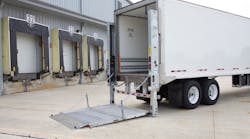Proper Liftgate Maintenance Makes A Big Difference In Efficiency and Safety
All fleets are concerned with vehicle productivity and safety because this helps improve their bottom line. That is one reason why, depending on the vocation, fleets add liftgates to their trucks and trailers.
There are many different styles of liftgates, including conventional; raillift/railgate; column lift; stowaway/tuckunder/flipaway; side loader; top lift; cantilever and gas bottle. Nevertheless, all liftgates are designed to enhance productivity in loading and unloading operations, especially when the shipping or receiving location doesn’t have a loading dock and manual loading and unloading is required.
The liftgate “has become an essential enabler and driver of efficiencies,” say officials at Maxion Lift Corp. (www.maxonlift.com), a leading North American liftgate manufacturer.
In addition, liftgates help fleets be more efficient, note officials at Thieman Tailgates (thiemantailgates.com), which markets a full-line of hydraulic liftgates for light, medium and heavy duty trucks and trailers. If specified properly for a given application, liftgates add flexibility to a truck or trailer, allowing them to load and unload at a dock, as well as at ground level for onsite deliveries at locations that don’t have docks.
Liftgates can also increase productivity, particularly with heavy cargo. This can help minimize product damage since cargo delivered with the help of a liftgate is less subject to damage from dropping or mishandling.
Additionally, liftgates help to reduce the physical demands on truck drivers when loading/unloading cargo from a truck or trailer by reducing the amount of times the loads must be handled physically. Liftgates also make it safer for the driver when loading/unloading, activities that are a regular and frequent source of workplace injuries.
Why Routine Maintenance?
Routine maintenance is essential in maximizing the useful years of a liftgate and in providing safe operation to those that rely on this equipment, Thieman Tailgates officials stress. Besides ensuring that the liftgate is operating as intended, periodic maintenance is an opportunity for a technician to confirm that all critical components are lubricated, check that all fluid levels are correct and address any minor issues that are discovered before they become anything of great significance, add Maxon officials.
There are a number of things fleets can do to maximize the reliability and life of their liftgates. First and foremost, advise officials at both Thieman Tailgates and Maxon, adopt the liftgate OEM’s guidelines/recommendations that detail the required maintenance and inspection, and the frequency of each.
Preventive maintenance (PM) intervals are based on liftgate cycles or a prescribed time interval. In a high-cycle application, PM intervals need to be increased accordingly.
Too often, officials point out, PM intervals are not observed and a liftgate only receives attention once a component has failed, causing the liftgate to become inoperable.
Thieman Tailgates officials suggest that fleets construct a maintenance checklist for their maintenance personnel to follow. Maintenance issues should be recorded in such a way that they are traceable to each individual liftgate, and there should be a consistent recording method so that each fleet maintenance facility reports an issue in the exact same way, even across different liftgate brands. This allows the fleet to detect trends for a specific liftgate that may not be getting used correctly by one operator, or is seeing higher than normal cycles or loads and which may require additional maintenance to keep up with the usage.
Seeing reoccurring issues with a particular liftgate brand can assist with purchasing decision making in the future. It also allows the fleet to see repeating issues that only may be happening at one maintenance facility.
A good program, officials say, will detect any such trends and they can be addressed so that maintenance costs and repairs decrease over time.
The Operator’s Role
Fleets should educate users on the proper usage of the liftgate, as improper usage or improper stowing of the liftgate can shorten its life, say Thieman Tailgates officials. Operators should be exposed to new liftgates and have some coaching on properly maintained equipment as part of their training.
The operator of the liftgate should be tasked to perform a quick daily visual and operational inspection of the liftgate, adds officials at Maxon. This is no different than the walkaround that is performed on a vehicle to ensure all lights and systems are operable before hitting the road. Small items that are noted on a daily inspection can be addressed before they become more significant.
Moreover, operators ought to be encouraged to report equipment that is not operating properly, they add. Problems caught early through routine maintenance and inspection, or through operator reports, can result in timely repairs that can reduce further expense and downtime if the same problems were to go ignored or without detection.
The operators are the people that see the equipment the most and are often the first to know that something is not operating correctly, officials with Thieman Tailgates point out. Encourage them to bring those issues to the attention of maintenance personnel.
Different Liftgates
As noted previously, there are many different models of liftgates designed for use in specific applications for particular cargo-handling needs and vehicles. Each has its own unique and specific maintenance requirements, based on the components that are used as part of the design of the lift system, and this will vary from brand to brand, note Maxon and Thieman Tailgates officials.
Therefore, they say fleets should utilize the maintenance guidelines and recommendations provided in their liftgate manuals that detail the required maintenance and inspection, and the frequency of each.
Anytime a fleet is uncertain about the required liftgate maintenance, inspection or frequency, as well as on operating instructions, they should contact the liftgate manufacturer for guidance, officials advise. Liftgate manufacturers want to stay involved because proper maintenance and inspection of their product will help improve the reliability, life and safety of their liftgates.




